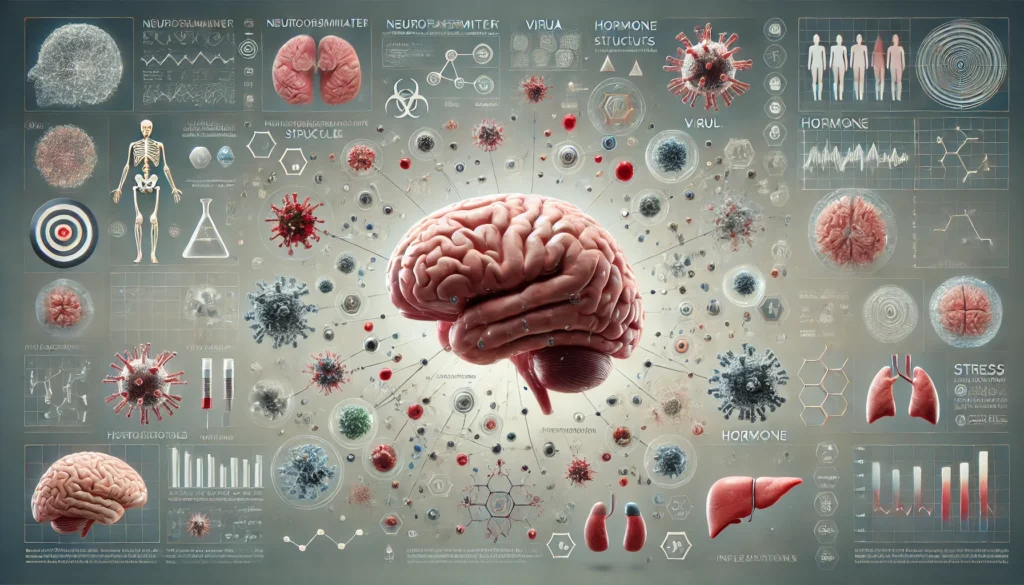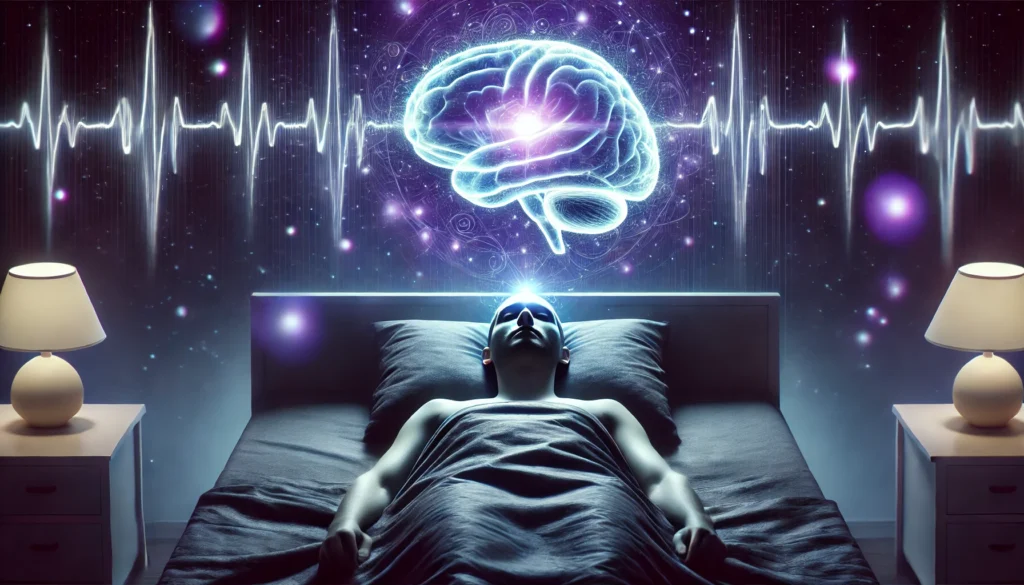Introduction
When someone says, “I feel like something is wrong with my brain,” it often carries more weight than a casual complaint. It reflects a genuine concern that something about their mental or neurological functioning has changed, and not for the better. These changes may be subtle or stark, sudden or creeping. They can appear as forgetfulness, cognitive fog, loss of motivation, or even physical sensations like pressure or tingling in the head. In our fast-paced, high-stress world, where neurological and mental health issues are on the rise, such statements are becoming increasingly common. But the underlying reasons are rarely simple, and understanding them requires a deeper dive into how the brain functions and what happens when it starts to fall out of balance.
You may also like: Do Carbs Cause Brain Fog? What Science Reveals About Carbohydrates and Mental Clarity
Many individuals asking themselves “is something wrong with my brain” are not hypochondriacs or alarmists. They are responding to internal signals—sensory feedback, disrupted routines, and functional changes—that warrant closer attention. This article aims to provide both scientific clarity and compassionate understanding. Whether the issue stems from anxiety, neuroinflammation, trauma, hormonal imbalance, or early signs of neurodegeneration, the most important first step is not to ignore the signs. The body has its way of communicating, and the brain, as its control center, often whispers before it screams.
In the sections that follow, we’ll explore what might cause a person to feel something is off neurologically. We’ll address common symptoms, clinical definitions, possible diagnoses, and what current neuroscience tells us about brain-body imbalances. We’ll also look at how to differentiate benign episodes from more serious conditions, and discuss practical steps for assessment, intervention, and recovery. If you’ve ever thought to yourself, “what is wrong with my brain?” or felt afraid because “I can feel my brain in a strange way,” you’re not alone—and you’re not without options.

Understanding the Brain’s Alarms: Why You May Feel Something Is Off
The sensation that something isn’t quite right in your brain can come from several types of disruptions—neurochemical, structural, psychological, or systemic. Often, the earliest signs are cognitive: trouble focusing, forgetting things, or feeling foggy-headed. For some, it manifests as emotional volatility, paranoia, or detachment. For others, it’s more physical—like pressure in the skull, light-headedness, or even the sense that “I can feel my brain,” which, though technically impossible due to the brain’s lack of pain receptors, might suggest altered nerve signaling or heightened awareness.
When people begin asking, “is there something wrong with my brain?” it may be their intuitive response to invisible but real neurological or psychological changes. One of the most common contributors is chronic stress. Long-term exposure to elevated cortisol levels can literally alter the brain’s architecture, reducing the volume of the hippocampus and prefrontal cortex—areas essential for memory and decision-making—while increasing the size of the amygdala, which regulates fear and emotional responses.
Other subtle triggers include hormonal imbalances, particularly in thyroid function, estrogen/testosterone levels, and insulin regulation. These hormones play vital roles in brain chemistry. Nutrient deficiencies—especially in B vitamins, magnesium, omega-3 fatty acids, and vitamin D—also contribute to a sense of cognitive imbalance. Add to this mix poor sleep, chronic inflammation, and environmental toxins (such as mold, heavy metals, and certain pesticides), and you have a recipe for mental distress that is deeply physiological, not just psychological.
The key takeaway is this: when you start to say, “I feel like something is wrong with my brain,” it often signals a complex web of interacting factors. Recognizing and respecting that feeling is a critical step toward recovery.

What Is Wrong With My Brain? A Look at Common Triggers and Diagnoses
Trying to answer the question, “what is wrong with my brain?” begins with identifying whether your experience aligns more with a psychological, neurological, metabolic, or autoimmune disorder. Here’s what science and clinical experience say about some of the most common causes of altered brain function.
Mental health disorders like depression, anxiety, and bipolar disorder often produce symptoms that mimic or mask neurological problems. Depression, for instance, isn’t just a mood disorder—it’s increasingly understood as a systemic condition involving neurotransmitter depletion, inflammation, and changes in brain connectivity. This is why people often describe it in physical terms: “I feel heavy,” “My mind feels slow,” or “I can’t think straight.”
On the neurological spectrum, early signs of conditions like multiple sclerosis (MS), early-onset Alzheimer’s, or Parkinson’s disease can begin with vague sensations and cognitive changes. Inflammation of the brain (encephalitis), post-concussion syndrome, and small-vessel ischemia may also present with subtle brain dysfunction long before they appear on a standard MRI. In some cases, an autoimmune response can target brain tissue, leading to rare but serious conditions like autoimmune encephalitis or lupus cerebritis.
Metabolic disorders like insulin resistance, metabolic syndrome, and even celiac disease or gluten sensitivity can impact brain function significantly. Brain fog, fatigue, and mood disturbances are common complaints among people with undiagnosed food intolerances or blood sugar dysregulation.
Infectious agents, such as Lyme disease, Epstein-Barr virus, and COVID-19, are increasingly recognized for their neuropsychiatric complications. The sensation that something is wrong with your brain may, in fact, be neuroinflammation caused by the body’s immune response to a pathogen.
Sometimes, these questions arise after drug use or withdrawal. Whether from prescription medications, illicit substances, or even caffeine and alcohol, abrupt changes in neurochemical balance can make a person feel that their brain is “not working right.” This also applies to psychiatric medications, particularly SSRIs, benzodiazepines, and antipsychotics, where side effects and discontinuation syndromes are common.

I Can Feel My Brain: Sensory Disruption and Perceptual Changes
One of the most puzzling and unsettling sensations that leads people to wonder “is something wrong with my brain” is the vivid perception that they can physically feel their brain. While the brain itself has no sensory receptors, the membranes around it (meninges), blood vessels, and associated nerves can transmit sensations if inflamed, compressed, or disrupted. Migraines, tension headaches, and even sinus pressure can be misinterpreted as internal brain sensation.
Sensory processing disorders, particularly in individuals with autism spectrum conditions, PTSD, or generalized anxiety, may also contribute to altered bodily awareness. These individuals might say, “I can feel my brain buzzing,” or “I feel like my head is vibrating,” which reflects a real experience even if it’s difficult to explain or quantify. Sometimes this is linked to overstimulation of the vagus nerve or the trigeminal nerve, which connects the brainstem to facial and cranial regions.
Additionally, derealization and depersonalization—forms of dissociation—can create a surreal detachment where the person feels like their thoughts are not their own, or like their consciousness is hovering outside their body. These experiences often arise during periods of acute stress, trauma, or certain phases of neurological illness. While not inherently dangerous, they can be distressing and make one question their sanity.
So when someone says “I can feel my brain” or insists “I feel like something is wrong with my brain,” it’s often a sincere reflection of distorted sensory feedback, not delusion. A full neurological and psychological evaluation is warranted to explore these symptoms without stigma.

Early Signs That Something May Be Wrong With Your Brain
Before a diagnosable condition fully develops, the brain often gives early warning signs. These signs should not be dismissed, especially when they persist or interfere with daily function. If you’re asking, “is there something wrong with my brain?” look for these clusters of early indicators:
Cognitive symptoms such as short-term memory lapses, reduced attention span, frequent confusion, or trouble finding words can be subtle but meaningful. Emotional instability, rapid mood swings, unexplained irritability, or loss of interest in previously pleasurable activities may also signal changes in brain chemistry or structure.
Physical symptoms like headaches, dizziness, light sensitivity, or unusual tingling in the extremities or scalp should also be noted. More unique signs include changes in handwriting, visual perception, sense of smell, or spatial orientation—especially if these are new developments.
Behavioral changes are another red flag. Increased impulsivity, disinhibition, social withdrawal, or obsessive thinking patterns may reflect frontal lobe or limbic system involvement. Sleep disturbances, nightmares, or circadian rhythm shifts also deserve attention, as the brain’s health is closely tied to its rest cycles.
In children and adolescents, changes in academic performance, regression in milestones, emotional outbursts, or new repetitive behaviors should prompt early neurodevelopmental assessment. In older adults, subtle shifts in language, financial management, or interpersonal dynamics may be the earliest signs of mild cognitive impairment or neurodegeneration.
Regardless of age, when these signs accumulate or worsen, the inner voice saying “what is wrong with my brain?” deserves validation and investigation.

What To Do If You Feel Something Is Wrong With Your Brain
Acknowledging that “I feel like something is wrong with my brain” is the first and most powerful step toward resolution. The next step is structured evaluation. Begin with a comprehensive health assessment, ideally with a neurologist, psychiatrist, or integrative physician trained in functional medicine. Bloodwork can assess thyroid function, inflammation markers (like CRP), vitamin levels, hormones, and potential infections.
Neuroimaging techniques like MRI or CT scans may rule out structural anomalies, tumors, or signs of stroke. EEGs can detect electrical disturbances, including seizures or sleep abnormalities. Neuropsychological testing evaluates memory, attention, language, and executive function, offering a functional snapshot of cognitive performance.
From a therapeutic standpoint, treatment depends on the root cause. Nutritional interventions, such as addressing deficiencies in B12, folate, omega-3s, and magnesium, can yield significant improvements. Sleep optimization, exercise, stress management techniques (like mindfulness and cognitive behavioral therapy), and trauma-informed care also play crucial roles in brain rehabilitation.
In cases involving mental health disorders, psychotropic medications, talk therapy, and lifestyle support create a multi-pronged approach. When autoimmune or infectious causes are identified, anti-inflammatory and immunomodulating therapies may be necessary.
Most importantly, stay empowered. Your brain is neuroplastic—it can change, heal, and adapt. Many people who once feared they were losing their minds have gone on to regain cognitive clarity, emotional stability, and a renewed sense of self.
Frequently Asked Questions
1. What does it mean if I feel like something is wrong with my brain?
Feeling like something is wrong with your brain often signifies a real physiological or psychological imbalance. This sensation can arise from stress, neuroinflammation, nutritional deficiencies, hormonal disruptions, trauma, or early neurological disorders. It’s a signal from your body that something needs attention. Though not always indicative of a severe condition, it should not be ignored. Seeking professional assessment can help identify root causes and initiate early intervention strategies.
2. Is it normal to feel like your brain is buzzing or vibrating?
Yes, many people report sensations such as buzzing, tingling, or vibrating in their head during periods of high stress, neurological overload, or sleep disruption. These may stem from overstimulation of cranial nerves or heightened sensory awareness. Migraines, anxiety, and certain medication side effects can also trigger these sensations. If persistent or accompanied by other symptoms like vision changes or balance issues, a neurological exam is advised.
3. Can anxiety make me feel like my brain is broken?
Absolutely. Anxiety disorders can produce intense cognitive and physical sensations that mimic neurological disease. People often describe racing thoughts, disconnection, brain fog, or even depersonalization as signs that their brain feels “off.” These are not imagined—they reflect genuine physiological changes in brain activity and neurotransmitter levels. The good news is that anxiety is highly treatable with therapy, lifestyle interventions, and, if needed, medication.
4. What should I do if I’m scared something is wrong with my brain?
Start by validating your concern. Then seek a thorough medical and psychological evaluation. Rule out reversible causes such as sleep deprivation, nutritional imbalances, or hormonal shifts. Keep a symptom journal to track patterns. Consult with professionals who take your experience seriously. The fear itself is a sign that support is needed—and you deserve compassionate, evidence-based care.
5. Why do I feel sensations in my head if the brain has no pain receptors?
While the brain itself doesn’t feel pain, the surrounding tissues—blood vessels, nerves, meninges—do. Inflammation, muscle tension, sinus issues, or migraines can cause sensations interpreted as internal brain pressure or discomfort. These sensations are real and can indicate underlying imbalances even if imaging studies come back normal. Listening to your body is key.
6. Could my symptoms mean I’m developing a neurological disease?
It’s possible but not guaranteed. Neurological diseases often start with subtle cognitive, emotional, or sensory changes. However, many symptoms overlap with stress, anxiety, hormonal shifts, or even chronic fatigue. Only comprehensive evaluation can distinguish between benign and pathological causes. Early detection leads to better outcomes, so err on the side of investigation rather than dismissal.
7. How can I tell the difference between mental health and neurological issues?
The distinction can be blurry, as both types of conditions affect cognition, mood, and function. Mental health issues like depression and anxiety may not show on scans but are deeply rooted in neurochemistry. Neurological issues may involve structural or electrical changes observable through imaging or EEG. A multidisciplinary team—neurologist, psychiatrist, and psychologist—can help untangle the causes and guide tailored treatment.
8. What role does nutrition play in brain health?
A major one. Deficiencies in B12, folate, omega-3 fatty acids, magnesium, and vitamin D can directly impair cognitive function. Blood sugar imbalances, gut dysbiosis, and food sensitivities also impact brain chemistry and inflammation. Nutritional therapy is often a first-line intervention in functional medicine approaches to brain fog, mood disorders, and cognitive decline.
9. Is brain fog a real medical condition?
Yes, although it’s not a formal diagnosis. Brain fog describes a constellation of symptoms: mental fatigue, poor concentration, forgetfulness, and slow thinking. It can result from sleep deprivation, chronic stress, hormonal changes, autoimmune activity, and post-viral syndromes. Identifying and treating the root cause is essential to resolving it.
10. Can the brain heal itself?
In many cases, yes. The brain is remarkably adaptable. Through neuroplasticity, it can reorganize neural pathways, regenerate cells, and form new connections. Healing requires a multi-dimensional approach that includes sleep, nutrition, movement, mental stimulation, emotional support, and often, professional treatment. Even in cases of injury or chronic illness, improvement is possible with the right plan and persistence.

Conclusion
If you’ve ever caught yourself thinking, “I feel like something is wrong with my brain,” know that your intuition is a valuable diagnostic tool. It reflects your mind’s ability to detect subtle changes in function and internal balance. These experiences, though sometimes frightening, are invitations to investigate, understand, and heal. Whether the cause is rooted in neurochemistry, emotional trauma, lifestyle habits, or early-stage disease, the path forward is one of proactive care, scientific insight, and hope.
Modern neuroscience and functional medicine have shown that brain dysfunction is rarely random. It is often the result of modifiable factors—stress, sleep, diet, toxins, inflammation—that can be reversed or managed with the right tools. If you’re asking yourself, “is there something wrong with my brain?” the answer may not be simple, but it is discoverable. The body doesn’t lie. Your concerns deserve clarity, your experiences deserve respect, and your brain deserves care.
Was this article helpful? Don’t let it stop with you. Share it right now with someone who needs to see it—whether it’s a friend, a colleague, or your whole network. And if staying ahead on this topic matters to you, subscribe to this publication for the most up-to-date information. You’ll get the latest insights delivered straight to you—no searching, no missing out.
Further Reading:
Confusion and Fatigue: What Science Says About the Hidden Causes and Health Risks
Brain Is Mush Meaning: Understanding Cognitive Fog, Burnout, and Mental Exhaustion



